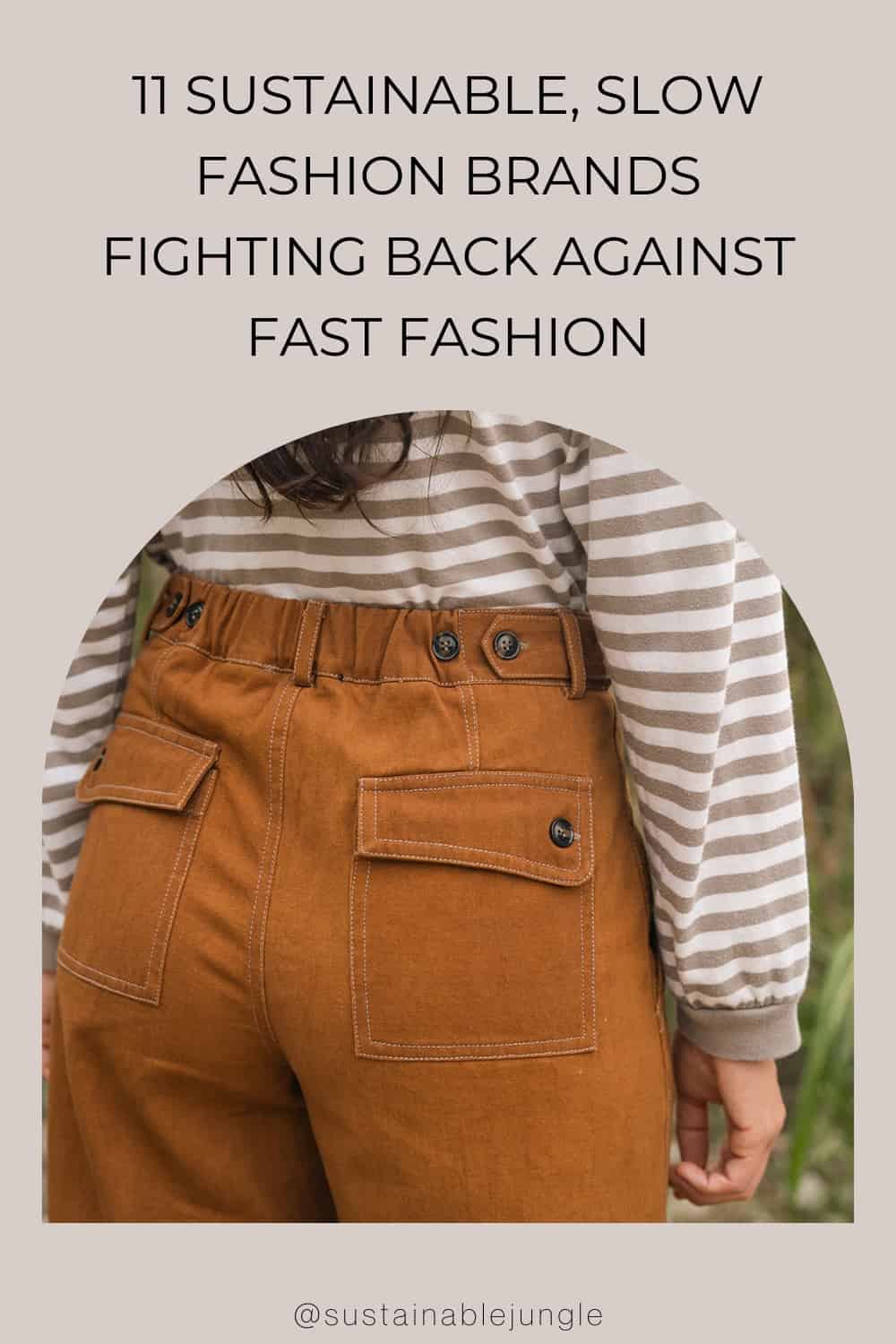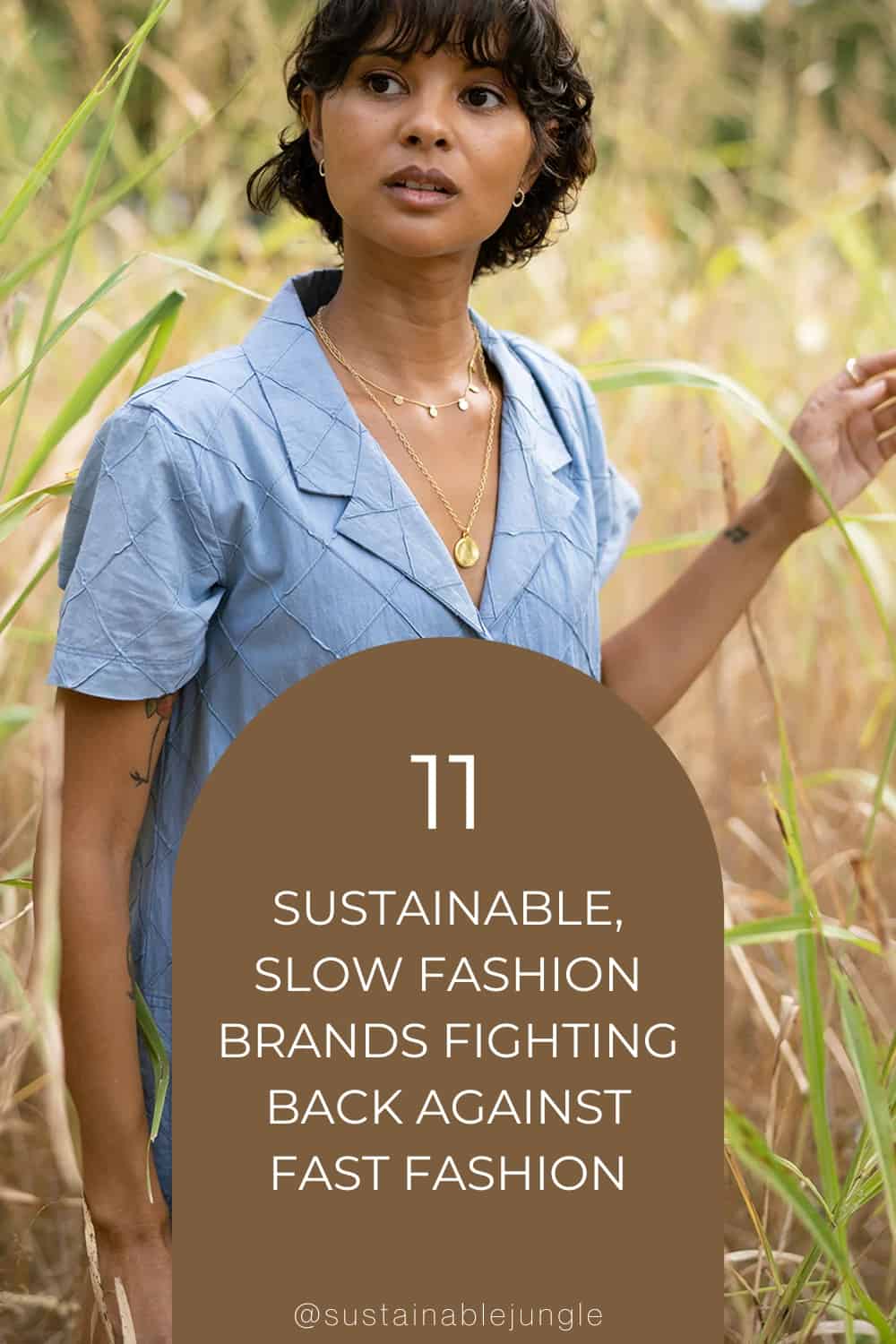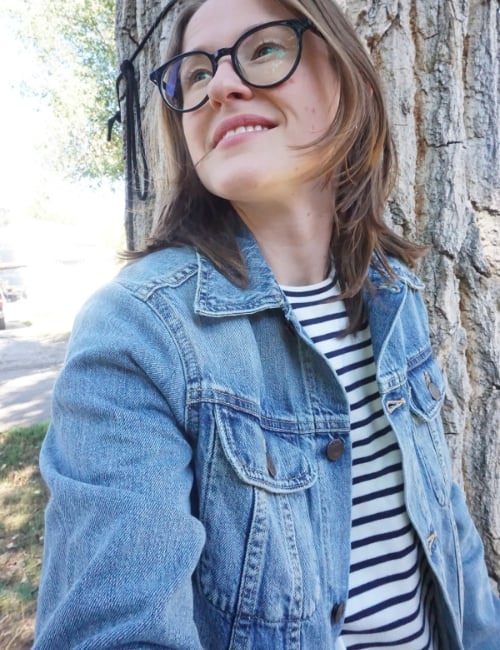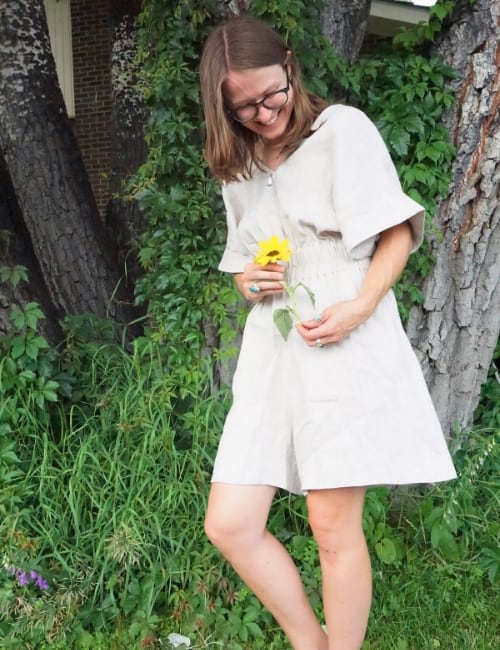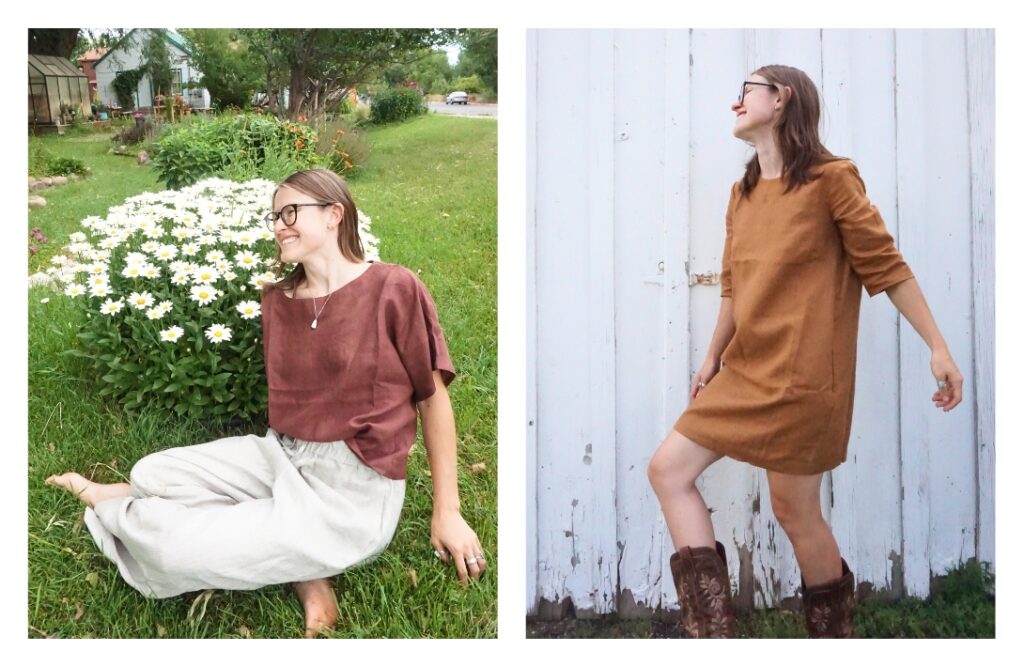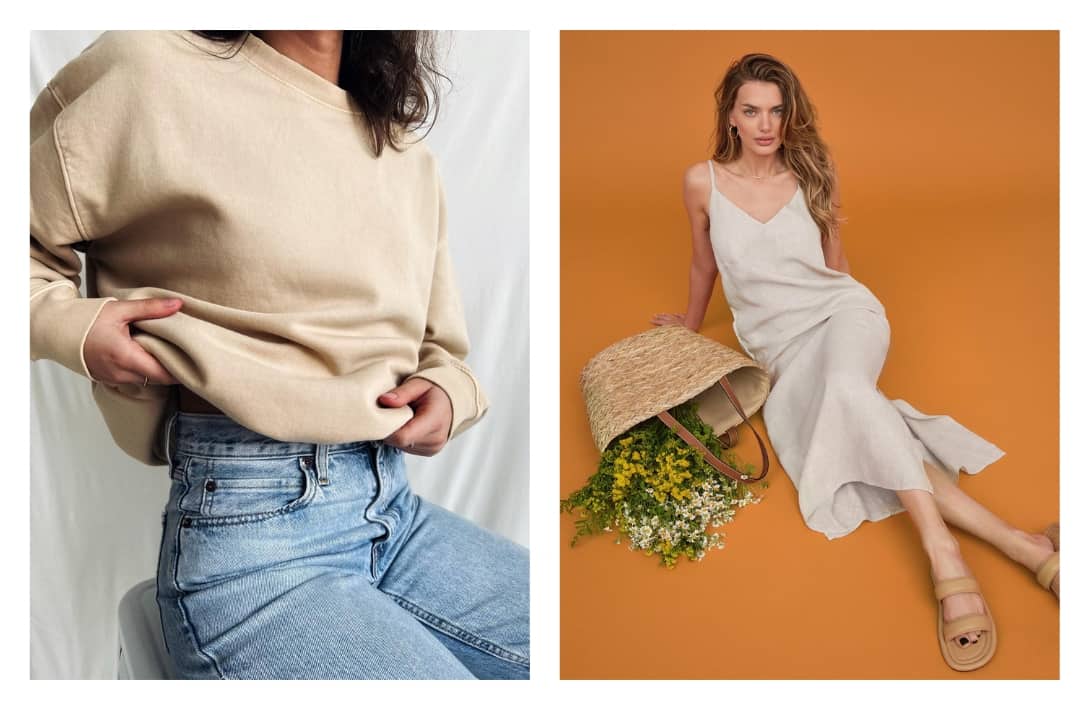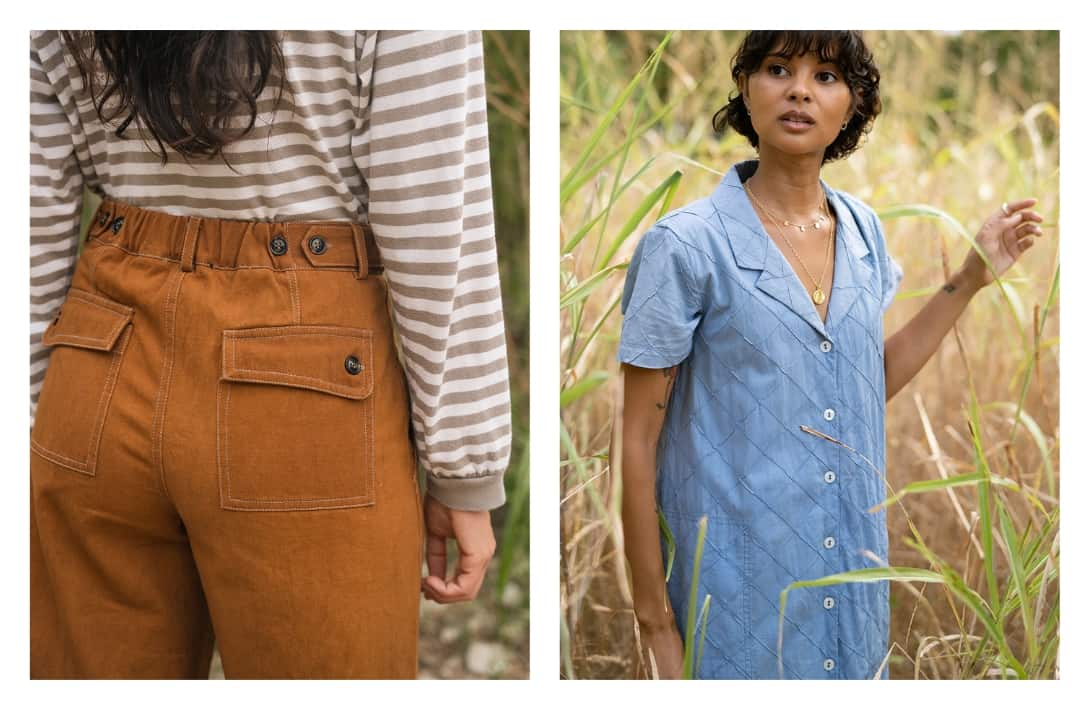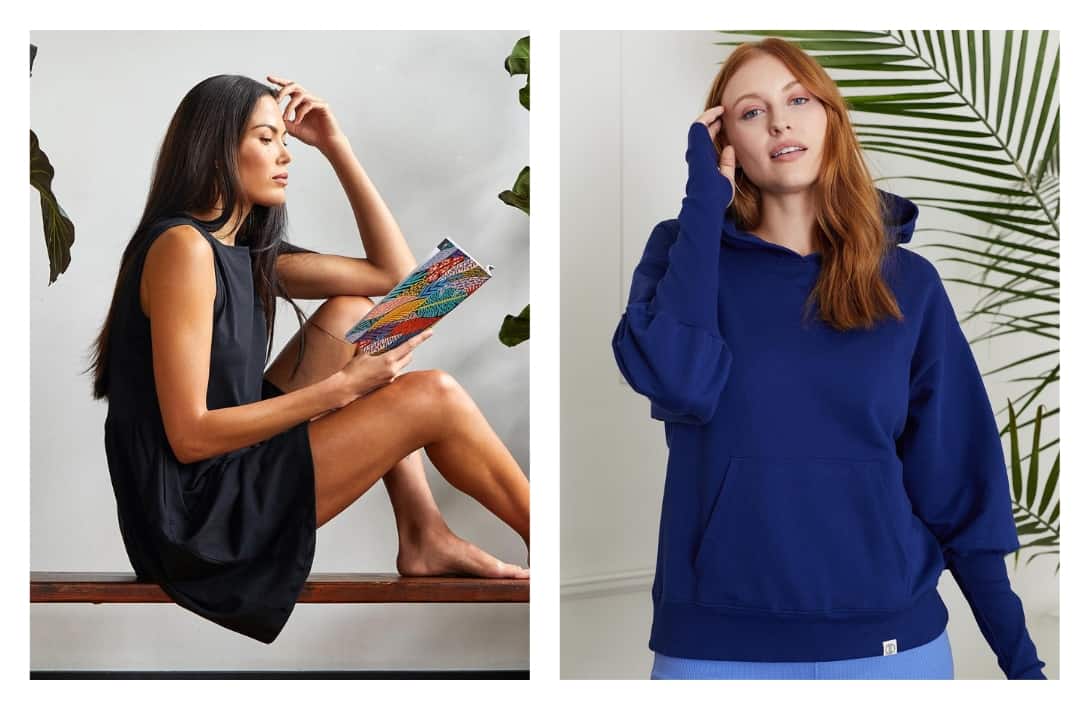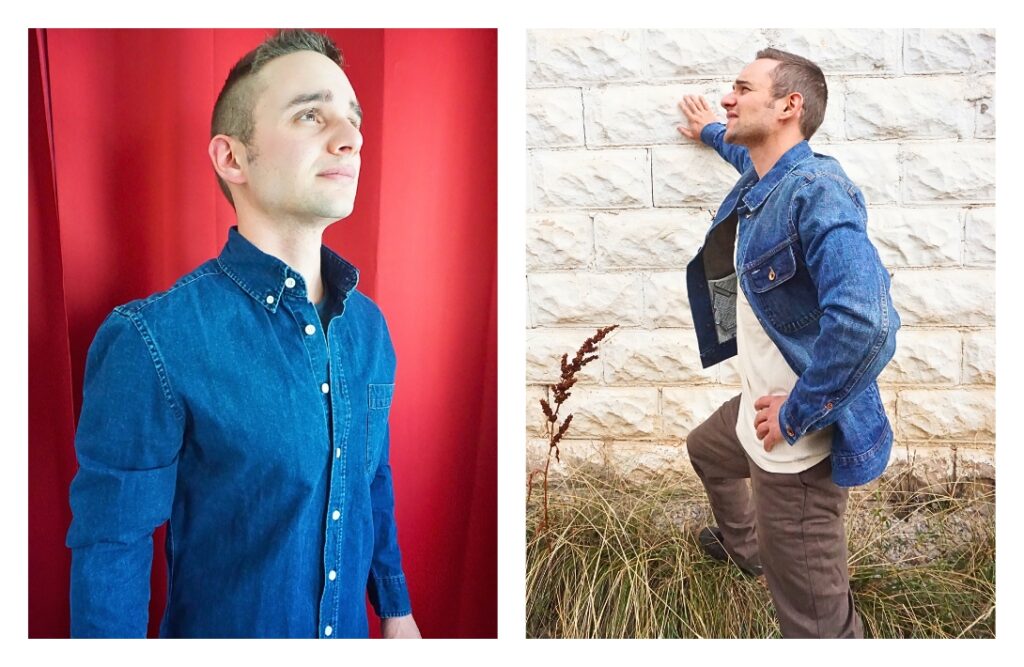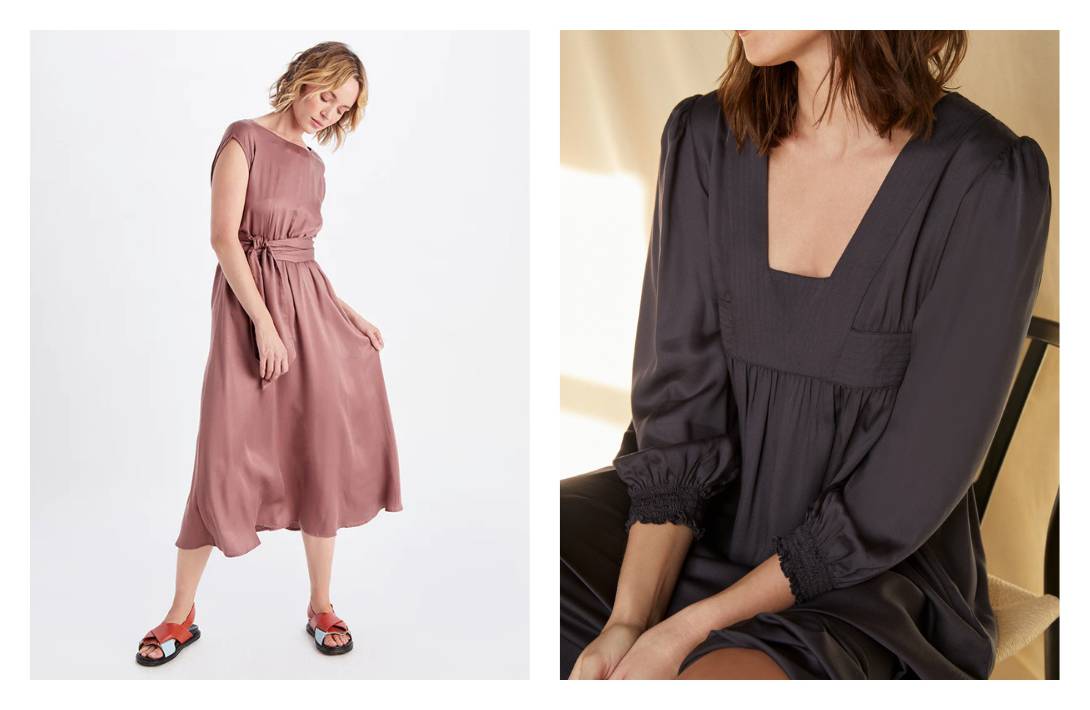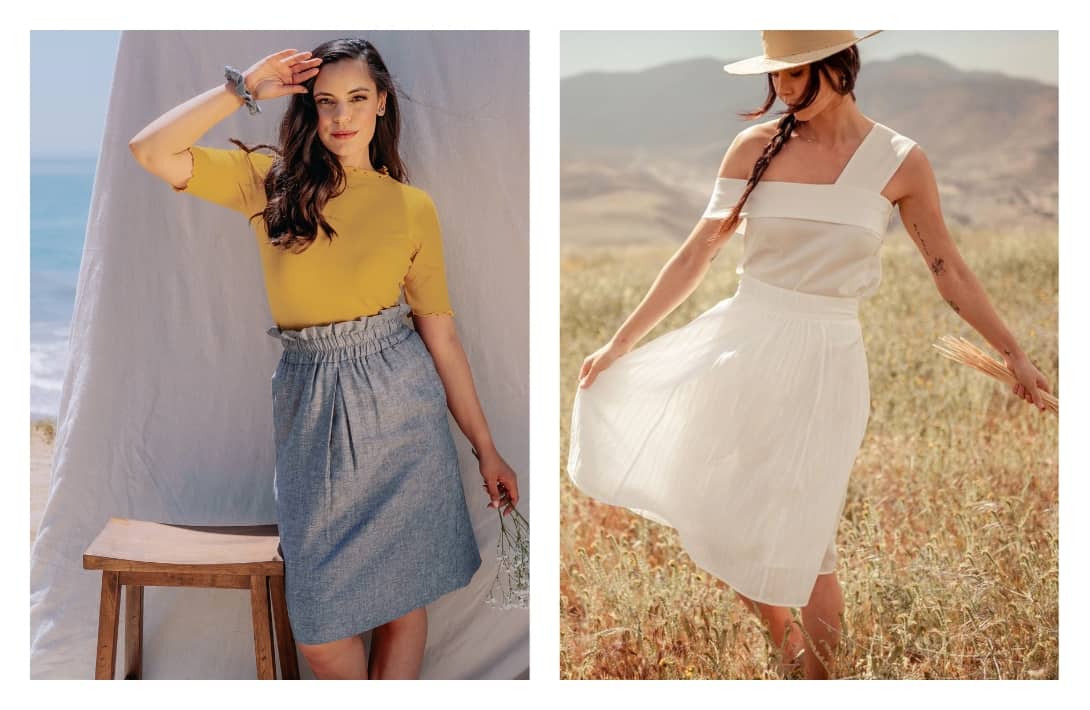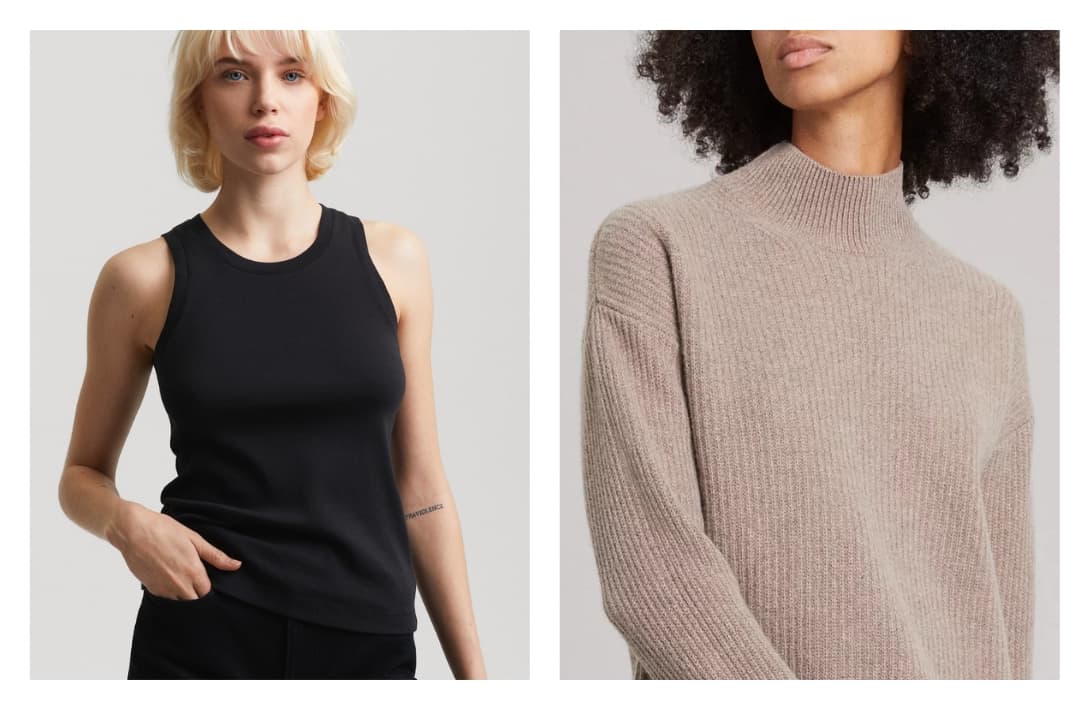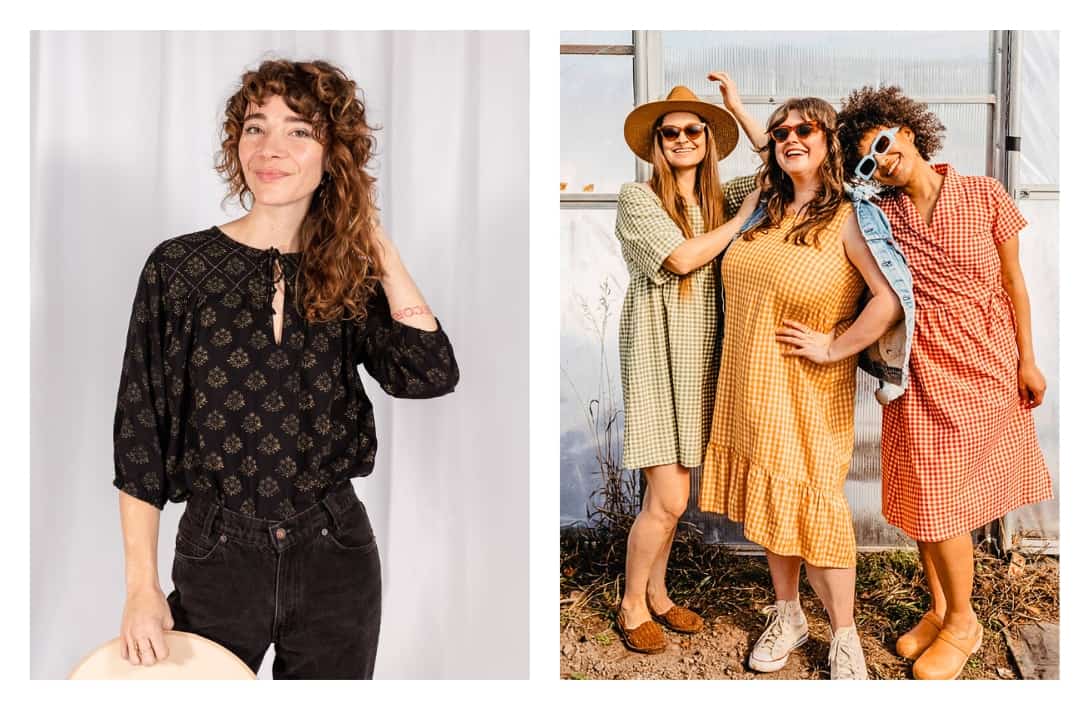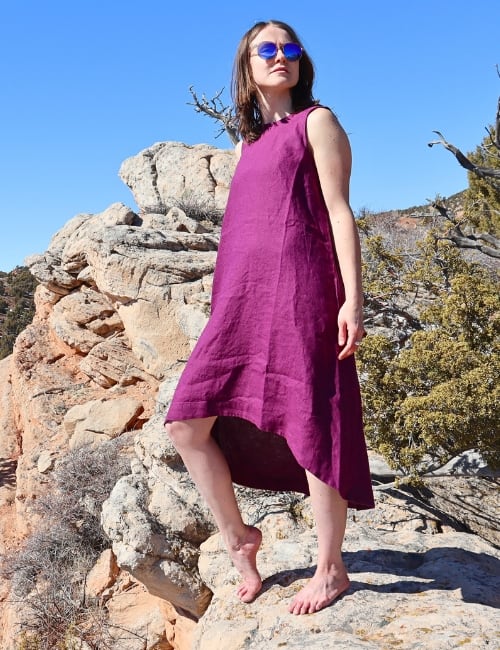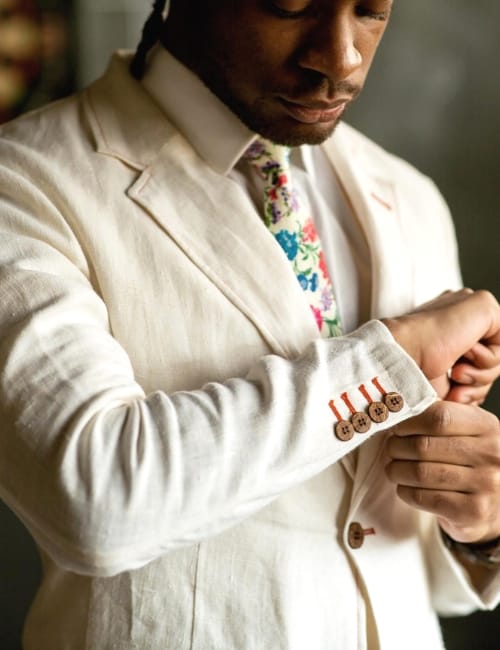11 Sustainable, Slow Fashion Brands Fighting Back Against Fast Fashion
Take a deep breath. Slow down with us for a moment.
It’s time we channel our slow fashion angel on our shoulder, not the fast fashion devil.
You know, the one that convinced you to buy that metallic body con dress that ripped the first night you wore it.
Slow fashion brands save us from more than just cheap fashion mishaps. It’s the eco-friendly solution that might just bring the fashion industry back from the brink.
Everything we recommend to you on Sustainable Jungle is independently researched and we ask all brands to confirm their claims. To avoid waste, we test products on an as needed basis. This post contains affiliate links. If you buy something through our links, we may earn a small commission. Learn more about why we do this here.
The Best Non-Fast Fashion Brands For Everlasting Eco Style
We like a brand who ensures sustainable production down to the very last button, and MagicLinen is no exception with their all-linen lineup of small batch clothing.
MATE the Label may be one of the popular slow fashion brands, but they keep their manufacturing small. Their 100% Los Angeles-based supply chain reminds us how important it is for brands to keep a close eye on manufacturing.
Among men’s non-fast fashion brands, Taylor Stitch’s inspiring initiatives like pitching in locally, and supplying durable materials makes them one of the more sustainable brands on the list.
If slow fashion is your style, but slow reading isn’t, go directly to the end to see our definition of what makes a slow fashion brand.
The Full List Of Slow Fashion Clothing Brands
- Magic Linen | Visit Store
- MATE the Label | Visit Store
- HarperSage | Visit Store
- LOVETRUST | Visit Store
- ABLE | Visit Store
- Eileen Fisher | Visit Store
- Taylor Stitch | Visit Store
- Neu Nomads | Visit Store
- Valani | Visit Store
- ASKET | Visit Store
- Mata Traders | Visit Store
1. MagicLinen
About MagicLinen
Price Range: $20–$149
This Lithuanian-based brand derived from the desire for timely pieces, without a long-lasting footprint created MagicLinen.
We’re happy to snuggle up, wrap, wear and lounge in this linen clothing brand’s all-encompassing line of men and women’s clothing, pajamas, and sustainable bedding.
If you’re looking for easy, breezy and effortless style, our favorite outfit combo is the Midway Loose-Fit Linen Top and Besalu Baggy Linen Pants. It fits beautifully and is so loose and comfortable that we can wear it even on hot days.
There’s no shortage of custom colorways to choose from, but we’re particularly fond of the Tuscan Red—perfect for sipping some Tuscan red wine outside on a warm summer evening!
MagicLinen’s Ethical & Sustainability Practices
Materials:
MagicLinen uses quality materials, including natural linen that is OEKO-TEX certified.
It’s sustainably stone-washed for softness, but rest assured your linen clothing will continue to get softer as you wash and wear them, too.
Some items feature coconut buttons.
Supply chain & labor practices:
MagicLinen’s factory, situated in Lithuania, crafts each of their linens in-house and selects materials from sustainable sources.
The flax plant is an important staple in Lithuania, providing jobs and income to those who grow, sell and stitch using this magical, resilient plant.
This small clothing company willingly participates in third-party audits to ensure workers at their family-owned factory are treated well.
Carbon commitments & green practices:
Their cornstarch and PBAT mailers are just another piece of this sustainable puzzle.
MagicLinen’s made-to-order approach ensures products aren’t suffering from mass production and waste.
Speaking of waste, MagicLinen takes care not to have a lot of it, by using scrap materials to make not only their linen garment tags, but smaller seasonal items like tote bags, tea towels and Christmas ornaments.
Inclusivity:
Sizes range from XS-XL in most items.
Community & charitable giving:
MagicLinen supports a number of local charities and is known to drive new social initiatives.
2. MATE the Label
About MATE the Label
Price Range: $15–$268
We’re happy to include MATE the Label in our close circular fashion circle.
This organic clothing brand creates luxuriously comfortable loungewear, activewear, and basics to detox our closets from fast fashion foes.
We turn to this mate of ours for their women’s tanks, tees, thermals, sweats, jumpsuits, hoodies, shorts, bottoms, and more.
Make a mini MATE with their line of organic kids clothes like the Mini Organic Cotton Classic Tee.
MATE the Label’s Ethical & Sustainability Practices
Materials:
MATE uses low impact dyes and biodegradable fabrics like organic cotton, linen, and TENCEL™.
Supply chain & labor practices:
Here’s what makes this Certified B Corp one of the best: sewing, cutting, dying, processing, packaging, and shipping all happen in Los Angeles—within 17 miles of their HQ, to boot!
Organic cotton comes from India, TENCEL™ from Austria, and linen from China.
Carbon commitments & green practices:
“V localized” manufacturing = small transportation emissions. Which they then offset per their Climate Neutral certification.
They take back and recycle old products via their REMATE program, use recycled/recyclable packaging, and boast an office equipped with eco-friendly supplies and on-site composting.
Inclusivity:
Their Extended Collection increases their XS-XL range to 1X-3X (with models to reflect).
The company is female-founded and operated by a mostly-woman team.
Community & charitable giving:
MATE is a friend to all, so it’s only natural that this 1% for the Planet member has donated over $95,000 to nonprofits.
3. HarperSage
About HarperSage
Price Range: $88–$198
HarperSage’s interesting origin story suffers the plight of many other women-owned businesses and brands.
With 75% of garment workers being women, but most of the industry controlled by men, Harper Sage wanted to combine “tom-boy” styles with girly flare, which wasn’t readily available in the current market.
The Harper styles include floral prints, flowy dresses, and embroidery, while the Sage half is a little more comfy pants and functional shirts. You’ll see both styles reflected across their range of sustainable jumpsuits, dresses, jackets, pants, tops, and accessories.
For the working gal who likes to keep it practical (but still like a bit of femininity) the Sage Essential Shirt Dress is a “wardrobe workhorse” that won’t stop you from doing anything and everything.
HarperSage’s Ethical & Sustainability Practices
Materials:
While their main fabrics of choice are deadstock cotton, linen and TENCEL™ lyocell fabric, there are a few exceptions that support sustainable materials differently.
With their women-owned factory in India, founder Meghan visits India regularly to hand-select fabrics from the local markets and support the community where the factory workers’ live and thrive. These materials are viscose crepe and voile on select dresses.
Supply chain & labor practices:
This ethical clothing brand uses a Sedex certified factory to ensure all workers are paid fair wages, protects workers, and must function sustainably.
Carbon commitments & green practices:
Using 70% deadstock fabrics in 2022, Harper Sage strives to only develop 10% of their fabrics in the future to ensure new life is given to available fabrics.
Inclusivity:
Most items range in size from XS-XL, with more inclusive sizing up to XXL coming soon.
Community & charitable giving:
HarperSage gives back and supports many reputable causes, like selling decals to highlight the reality of human trafficking.
The Duo Crew connects women across 6 “cohort cities” that encourage friendship, connection, and trying new things.
4. LOVETRUST
About LOVETRUST
Price Range: $48–$98
Brooklyn-based LOVETRUST combines simple styles with long-lasting fabrics.
Appealing to conscious consumers who are in search of an ethical brand with accessible price points – (love)trust us, this is the one.
With everything coming in under $100, they’re one of the most affordable slow fashion brands, ensuring ethical basics are accessible to everyone.
Dresses, tops, bottoms, and cozy pajamas complete their organic cotton options.
Shrug on their organic cotton French Terry tee in slouchy, sustainable fashion.
LOVETRUST’s Ethical & Sustainability Practices
Materials:
GOTS-certified organic cotton makes up their slow fashion line.
Supply chain & labor practices:
Though a cheap slow fashion brand, they’re not cheap with their labor.
They work with a full service manufacturer who is SMETA-certified, ensuring workers are paid a fair living wage and work in safe conditions.
Carbon commitments & green practices:
As a small clothing brand, LOVETRUST is constantly striving to better their eco-friendly initiatives when it comes to sourcing, and packaging.
While keeping your garment safe, they use packaging suppliers like EcoEnclose and Noissue made of recycled paper.
LT’s Vault is a curated collection of vintage styles that have been pre-worn.
Inclusivity:
Sizes in tops are XS-XXL and S – XXL in bottoms.
5. ABLE
About ABLE
Price Range: $40–$398
What are some of the most famous slow fashion brands?
ABLE—co-founders of the Lowest Wage Challenge—is certainly on the list.
With their ethical production of goods and value on workers’ rights instead of a swelling profit margin due to cheaply made garments, this Nashville-based anti-fast fashion brand isn’t just doing it better themselves. They’re forging a path for others to follow.
You can shop for stylish tops, bottoms and everything in between, including jackets, jewelry, bags, and shoes.
For items that are always in style and never leave the site, their Signatures Collection embodies the best of slow fashion.
We have a few of these pieces, but the Bailey Classic is our fave because it is un-bailey-vably comfortable. Jokes aside, it’s easily the most comfortable denim jacket we’ve ever tried and came to our door feeling as broken in as our favorite pair of sustainable jeans.
ABLE’s Ethical & Sustainability Practices
Materials:
This popular non-fast fashion brand opts for natural sustainable materials as often as possible.
Their organic cotton is GOTS-certified, traceable from seed to sweater, and is produced in a zero waste factory.
ABLE’s denim, a notoriously dirty garment to produce, dye and use for scrap comes from Monty Mexico, a vendor that uses environmentally friendly options like enzymes that work as biocatalysts.
LWG-certified leather, sourced from Ethiopia, goes into ABLE’s ethical shoes and accessories. ABLE feels using a natural byproduct of the meat industry is not only sustainable but makes use of a readily discarded product.
They’re on the hunt for an innovative partner making plant-based leather without the substitutes being petroleum or chemical based.
Supply chain & labor practices
ABLE strives to connect with vendors, distributors and producers with high moral standing and tidy, fair business practices.
With factories or sourcing in Brazil, Portugal, Ethiopia, Nashville and Mexico, ABLE searches for certified factories or those working toward a manufacturing certification.
Carbon commitments & green practices:
ABLE’s leather tanneries follow strict environmental protections, and one of their Ethiopian partners uses 100% recycled water in their factory.
In fact, many partners use recycled water or purify water after use (some to drinkable level!).
To reduce their carbon footprint, ABLE sources all of their denim from nearby their Mexican factory to reduce shipping and uses recycled materials for shipping.
Inclusivity:
The broadest range of sizing on the list includes XXS to XXXL.
6. Eileen Fisher
About Eileen Fisher
Price Range: $78–$468
Eileen Fisher may be one of our favorite hemp clothing brands, but they’re so much more than that.
Brands like Eileen Fisher have been pushing for a more sustainable fashion industry long before it was on-trend to do so.
This New York brand believes in “A simple wardrobe. A simple life.”
Though their vast selection of sustainable clothing is anything but: tops, sweaters, outerwear, pants, jumpsuits, denim, dresses, skirts, sleepwear, shoes, and accessories.
Dress up the Sheer Silk Georgette Classic Collar Long Shirt and slow down on fast fashion trends using weak, unsustainable materials.
Eileen Fisher’s Ethical & Sustainability Practices
Materials:
EF uses sustainable materials like certified organic cotton, linen, hemp, FSC-certified TENCEL™ lyocell and modal fabric, RDS-certified down, LWG-certified leather, chlorine-free wool, and recycled polyester, nylon, and cashmere.
A handful are not-so-eco-friendly, like silk and viscose.
Supply chain & labor practices:
A Certified B Corp that’s big among slow fashion companies, their suppliers and manufacturers are widely spread.
They aim for transparency by showing where they’re located, what standards each adheres to, and releasing regular impact reports.
Child and forced labor is prohibited by their ILO-based Code of Conduct and they’re working to reduce human trafficking in the fashion industry overall.
Carbon commitments & green practices:
The Textile Exchange partner uses carbon emission reducing processes for all of their materials (e.g. linen grown using crop rotation and processed with dew retting).
They track progress using Science Based Targets Initiative to assess the impact.
Renewable energy-powered stores and green office buildings further their eco-friendly cause.
Renew allows you to resell your old Eileen Fisher duds and Waste No More turns unsellable garments into pillows and decor.
Inclusivity:
Most (but not all) garments from this sustainable plus-size clothing brand range from XXS-3X.
Community & charitable giving:
The Eileen Fisher Foundation supports women working for environmental justice on top of their many other NGO beneficiaries.
7. Taylor Stitch
About Taylor Stitch
Price Range: $40–$798
We’ve highlighted a lot of pretty darn good non-fast fashion brands in this list, but most of them cater primarily to women.
For menswear, Taylor Stitch is one of the best slow fashion brands USA shoppers have.
Their premise is “products that wear in, not out” and we like the trajectory of that now you’re shooting or the shirt you’re wearing.
Founder Michael Maher wanted to create a sustainable clothing built to last longer than one wood chopping session.
Anything from their range of pants, tops, jackets, and footwear are perfect for outdoor adventure, stopping in at the office, or a casual drop-in at the local pub.
The Jack is one of our favorites. We got it in Indigo, so it’s a lightweight and classy take on a denim shirt that we feel just as comfortable going out to dinner wearing, as doing yard work.
Taylor Stitch’s Ethical & Sustainability Practices
Materials:
All recycled and organic materials comprise Taylor Stitch’s product line from 100% organic cotton, heavy bag (a mix of polyester and cotton), boss duck (heavy-duty hemp fabric), recycled denim, yak wool, merino wool and leather.
Their outerwear is 100% organic cotton with a recycled nylon liner and recycled poly fill.
Supply chain & labor practices:
If we hope to create more brands that are not fast fashion, it begins with an entire supply chain of ethical production.
Taylor Stitch continues to source materials from their USA stomping grounds, where they have oversight in their US factory to establish and state all workers are paid an above-fair wage.
Carbon commitments & green practices:
Taylor Stitch believes in “closing the loop” which means long-lasting garments made out of deadstock fabrics that you can opt to exchange or repair.
Inclusivity:
Sizing includes XS – XXL.
Community & charitable giving:
If you have a project you need help on in the area, Taylor Stitch wants to support you with a helping hand.
Speaking of helping hands, they lend a few to charitable organizations such as World Central Kitchen, Campaign Zero, and Foundation for National Parks & Wildlife to name a few.
8. Neu Nomads
About Neu Nomads
Price Range: $65–$439
After years in the industry, fast fashion turned slow fashion duo Karen and Angela decided it was time to be the change they wanted to see in the (fashion) world.
Their anti-fast fashion brand business model included wardrobe staples at a reasonable price point with a clean supply chain.
Their dresses are as smooth as their operating procedures in factories around the world. Slip on Neu Nomads’ Belize dress in grass as one of your organic basics in the closet.
Neu Nomads’ Ethical & Sustainability Practices
Materials:
Neu Nomads’ plant-based fabrics are ethically sourced from renewable and sustainable spots around the globe, including TENCEL™, GOTS-organic cotton, eco-cashmere, OEKO-TEX certified linen, and SeaCell (seaweed fabric, made of sustainably harvested seaweed).
Eco friendly dyes color the garments, lessening the environmental impact.
Supply chain & labor practices:
Neu Nomads’ supply chain may be vast, but it doesn’t vary in ethical practices.
Every factory ensures workers are paid fair wages and have access to medical care.
Carbon commitments & green practices:
Neu Nomads’ sustainable practices extend to their packaging, with 100% biodegradable bags, with recycling options for cotton materials.
Their Eco-Jersey’s factory is a member of the Greenpeace DETOX campaign.
Pairing with TREET, Neu Nomads’ is closing the loop and coming full circle with a fashion chain that keeps re-loving garments long after you’ve had your fill.
Inclusivity:
Sizing stretches from XS to XXL for Neu Nomads.
9. VALANI
About VALANI
Price Range: $128–$298
VALANI’s “once upon a time” worthy pieces help us say “the end” to fast fashion. Anyone who promotes slow fashion is a true storybook hero, after all.
This TENCEL™ clothing brand offers a curated collection of feminine dresses, blouses, bottoms, skirts, and accessories.
We aren’t skirting sustainable fashion with VALANI’s Nora Paperboy Hemp Midi Skirt that features a super flattering wide scrunch waist paired with a simple and classy A-skirt silhouette.
VALANI’s Ethical & Sustainability Practices
Materials:
As a vegan slow fashion brand, VALANI’s pieces are made using plant-based materials like TENCEL™ , hemp, and banana fabric.
Their sustainable dyes are also plant-based and non-toxic.
Supply chain & labor practices:
Their sustainable clothing is made in either Chicago or a GOTS 6.0 certified facility in India.
At either location, tailors work in safe and clean conditions and are paid hourly rather than by piece.
Carbon commitments & green practices:
Fabric trimmings and offcuts become recycled materials for scrunches, pillows, toy stuffing, and packaging materials.
Inclusivity:
This female-founded trendy slow fashion brand offers sizes 0-12 (XS-L).
Community & charitable giving:
Feel good in your silky tree-based dress knowing it not only plants a tree, but that 10% of the profits go toward organizations specializing in female empowerment.
10. ASKET
About ASKET
Price Range: $20–$390
Wondering, “What are slow fashion brands in Europe?”
Ask ASKET and their “zero compromise garments – essentials made to last.”
Their Permanent Collection—to which they add just 3-4 wardrobe essentials per year—embodies anti-fast fashion philosophy. We really couldn’t ASKET for more than that!
One of the best affordable non-fast fashion brands for men (and women), ASKET offers tees, sweatshirts, knitwear, denim, trousers, outerwear, underwear, and accessories.
Cozy up to the idea of a Creme Mock Neck Sweater from one of this list’s top sustainable fashion brands.
ASKETs Ethical & Sustainability Practices
Materials:
You’ll find fabrics like extra-long staple Egyptian cotton, organic cotton, linen, traceable Merino wool and various recycled fabrics (ethical cashmere, wool, and polyester).
Most products (except their ethical men’s underwear) are elastane-free.
Supply chain & labor practices:
“Know your garments. Buy less, keep them longer.”
That’s why each product comes with an Impact Receipt, showing its cost, traceability, CO2 emissions, and where it was processed, sewed, laundered, dyed, and milled.
Their WRAP, SA8000, OEKO-TEX, and/or GOTS certified suppliers stand out for environmental and social rigor.
Carbon commitments & green practices:
ASKET never runs sales or promotions that encourage unconsidered consumption.
Between designing garments with end-of-life in mind, offering repair and recycling programs, and selling garment care products to ensure they last for years to come, ASKET is one of the best sustainable brands in terms of product circularity.
For shipping, they avoid air transport, use reusable packaging, and have a proprietary tool to help customers with sizing, reducing returns.
They also provide employees with an additional five vacation days if they travel by train instead of plane.
Inclusivity:
You’ll find men’s organic clothing in XS-XL sizes and women’s in XS–XXL or W34 pant size.
11. Mata Traders
About Mata Traders
Price Range: $78–$128
Mata Traders is a rare combination among slow fashion brands: affordable and with plus sizing.
Their range of ethical plus size clothing includes women’s tops, skirts, and dresses in cuts and patterns that are flirty and flattering for everyone.
In true Mata Traders’ fashion, pick up this Brea Wrap Dress made of 100% satin cotton and is 100% mother friendly.
Mata Traders’ Ethical & Sustainability Practices
Materials:
Mata uses fabrics like certified organic or conventional cotton, linen, rayon fabric, and some spandex.
Supply chain & labor practices:
Every purchase supports and empowers women in Nepal and India by fighting gender inequality through economic independence.
Unlike conventional factories, their fair trade certified factory cooperatives work with all skill levels and don’t dock pay for less productivity. You can’t get more slow fashion than that.
Carbon commitments & green practices:
Reducing energy consumption, this Green America Gold Certified business uses traditional handcrafting techniques and solar power in their main facility.
Inclusivity:
They tick the inclusivity box, both for size (US sizes 0-24 are covered) and budget.
Community & charitable giving:
Beyond good wages, they support mostly female workers with opportunities to learn literacy, parenting, computer skills, and more.
These training courses provided the catalyst for one embroiderer to organize a 200-women protest demanding access to water.
Did you know we Have a Newsletter?
We cover the latest in sustainable living, fashion, zero waste, beauty, travel, finance and more…
How We Found The Best Non-Fast Fashion Brands
Let’s slow it down for a minute. Just what is considered slow fashion? More importantly, how can you tell what brands are slow fashion?
When comparing fast fashion vs slow fashion brands, the latter consists of made-to-order or small batch clothing that won’t collect dust in a warehouse (or your closet).
Slow fashion is a movement giving practical meaning to sustainable and ethical fashion.
It asks us to step back and take stock of our clothing consumption, focusing on high quality, longevity, and circularity.
With that in mind, when asking ourselves, “What brands are not fast fashion?” we used these criteria:
Materials:
Sustainable fabrics form the basis of slow fashion (literally).
Our favorites are natural materials like certified organic cotton, linen, TENCEL™ modal and lyocell, ethical wool and down, and hemp, as well as recycled materials, whether deadstock fabrics or recycled plastic bottles.
- Certifications: OEKO-TEX, Global Organic Textile Standard (GOTS), Leather Working Group (LWG)
Supply chain and labor practices:
We want to know what brands don’t use child labor, pay their employees living wages, and provide safe work spaces—and for that, brands need to know themselves.
That’s why we love it when sustainable fashion companies slow down enough to actually get to know the details about where pieces are made. The more details they can share about wages and working conditions of where their products are made, the better.
Fair trade, living wages, safe and empowering work environments, and local manufacturing are the cherry on top of any ensemble.
- Certifications: Fair Trade, Social Accountability International (SA8000), Worldwide Responsible Accredited Production (WRAP), International Labor Organization (ILO), Sedex Members Ethical Trade Audit (SMETA), Sedex, B Corporation (B Corp)
Carbon commitments & green practices:
The mark a truly sustainable brand is designing high quality clothes that last for years to come.
That also means clothes that aren’t influenced by fake seasons and the need to “keep up with the Joneses.” Slow fashion pieces should seamlessly fit into any capsule wardrobe (AKA minimalist wardrobe).
Carbon offset programs and circularity by way of garment recycling programs and use of deadstock fabrics are other ways brands can go green.
When you have small batch clothing that’s made to order, that also slows down the fast fashion machine.
Inclusivity:
No one should have to choose fast fashion because they can’t afford not to.
So we were thrilled to see that many brands have incorporated measures to keep their clothes size inclusion and affordable (without sacrificing the planet).
Community & charitable giving:
Support of social and environmental organizations, tree planting, and discounts for essential workers are a few ways slow fashion can be more than just a well-made and well-loved product.
Final Thoughts On Non-Fast Fashion Clothing Brands
Slow eco-friendly fashion is the new black.
It’s the only way to dress, and it’s where the fashion industry needs to go.
Remember ASKET’s take on what slow fashion really means:
“Every garment has a story, a cost and an impact. Green, Conscious, Recycled or Offset isn’t moving the needle. In fact, it’s confusing us into thinking we can actually shop our way out of the problem.”
That in mind, the best thing we can do is wear what we already own or buy from second hand stores.
Beyond that, join these slow fashion companies in saying F.U. to fast fashion and encourage friends to do the same by passing this article along.
Pin these:
